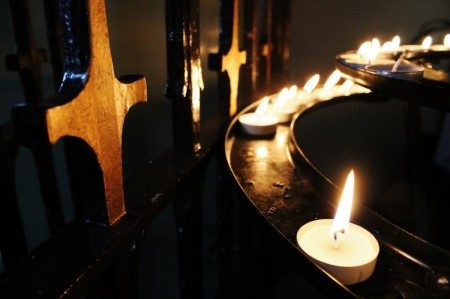For more than a century, the Christian church around the world has dedicated a week in January to prayer for Christian unity. I have often participated myself. This year the effort seems especially relevant.
Our own nation is as fractured as it has been in my lifetime. We are quick to blame and slow to compromise, quick to judge and slow to respect and deliberate. Many have lost confidence in their government, trust in their neighbors, peace in their homes, and hope for their future.

The world itself seems fractured as never before. It is in your face with the evening news: violence, tribalism, chaos, murder and mayhem. We are fractured as a race, it would seem. We do not see in one another “human family.” We see other. We see danger.
The spaces within our own hearts are pretty fractured, too. “I decide one way, but then I act another,” St. Paul complained long ago. “My decisions, such as they are, don’t result in actions,” he went on. “Something has gone wrong deep within me” (Romans 7:15, 20, The Message). But St. Paul’s problem is as current today as it was twenty centuries ago. We are broken. We are fissured and unwholesome.
The week of prayer for Christian unity falls strategically between a pair of ancient commemorations. A day commemorating the Confession of Peter falls on January 19. The Conversion of Paul is observed on January 26. The commemorations are perfect bookends for a week of prayer for wholeness, it seems to me.
On January 19 we remember that famous encounter between impetuous Peter and his gracious Lord.
The encounter is notable for its simplicity. “Who do you say that I am?” Jesus queried. “You are the Christ, the Son of the living God,” Peter replied. He did not pull out the catechism. He did not convene a theological committee to study the issue. Peter looked simply to Jesus, and found in him the Center and “Yes!” to all the promises of God (cf. 2 Corinthians 1:20).
Jesus didn’t convene a study committee, either. He acknowledged the simple truth of Peter’s confession. “You’ve got it,” he said (I paraphrase.) “The Truth about Me has made you a Rock. The church will stand as long as it stands on this simple confession of faith” (cf. Matthew 16:13-20).
On January 26 we remember the blinding light that knocked Saul from his horse and made him an Apostle.
This encounter is notable for its simplicity, too. “What ever are you doing?” Jesus queried (I paraphrase). “Well, who are you to ask?” was Paul’s reply. “You’re talking to Jesus,” the Savior continued. “Now get up. And get going. I’ve got work for you to do” (cf. Acts 26:12-18).
Once again, we find no catechisms or doctrinal committees. Just: stand up. Just: get going. Then: point the peoples of the world to me.
The apostles were called to get over themselves, you might say. They were called to reevaluate their own exaggerated estimate of their special abilities, theological insights, and missional significance. Peter thought that he knew all there was to know about the promises of Messiah: but they didn’t lead to Jesus. Paul thought that his service to tradition was doctrinally pure and missionally strategic: but it had no room for Jesus. He needed to be “knocked off his high horse.” (This is where the saying comes from, I think.) The great apostles needed to take themselves less seriously before they became apostles, and simply follow Jesus.
This is where Christian unity is born and peace finds a footing. This is where missional significance actually happens – not in our impressive theologies and accomplishments, but in our relationship with Jesus, the Savior of the world. This is where we are made whole.
I love this week in January. I participate every year. I love the way that it sweeps from Peter to Paul, confession to conversion, preconceptions and disharmony to wholeness and faith. Christian unity is radically simple, really. We look to Jesus for our confession. For our commission, we point people simply to him.
“I’m sending you off,” Jesus told Paul, “to open the eyes of the outsiders so they can see the difference between dark and light, and choose light, see the difference between Satan and God, and choose God. I’m sending you off to present my offer of sins forgiven, and a place in the family, inviting them into the company of those who begin real living by believing in me” (Acts 26:17-18, The Message).
Our fractured and unbelieving world doesn’t need additional divisive distractions, after all. We need Jesus. Simply Jesus.